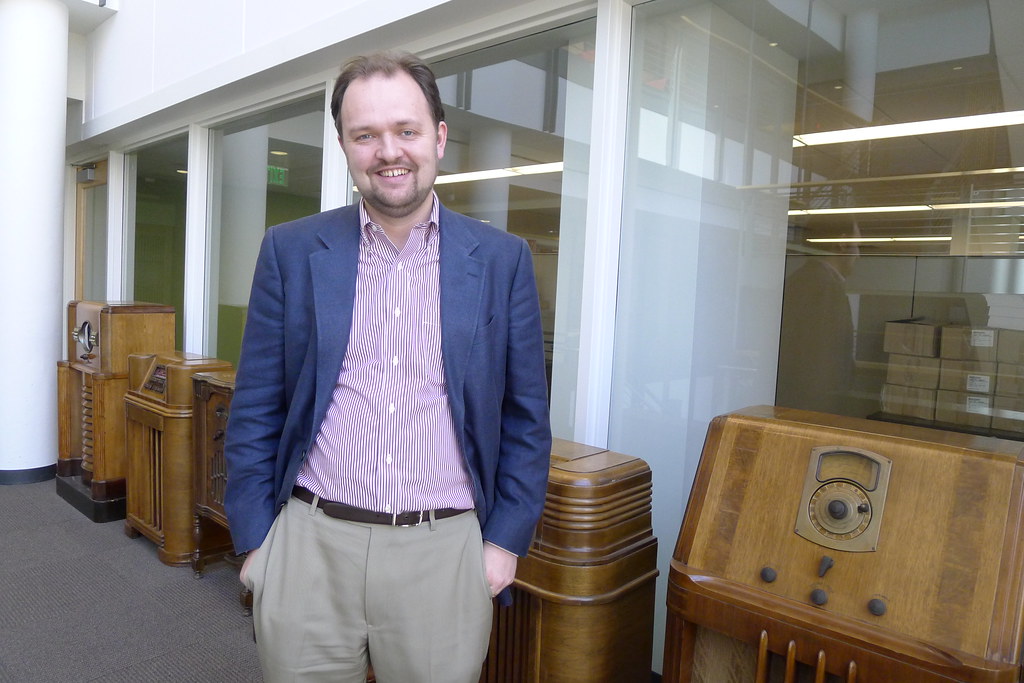I am aware that the question I have posed in the title will leave some FPR readers apoplectic, clutching their dog-eared copies of That Hideous Strength in horror. Allow me a moment to explain. I come to praise Douthat, not to bury him.
First off, Ross suffers no delusions of grandeur. When I spoke with him about his new book Believe: Why Everyone Should Be Religious I pointed out some parallels to C.S. Lewis’s Mere Christianity. Douthat quipped, “We could call it a pale imitation of Mere Christianity…I am trying to do something more like Mere Religion.” Whereas Lewis made the case for Christianity explicitly, Douthat’s Believe is a case for the plausibility of religion in general, a sign of how post-Christian we have become.
Nevertheless, the parallels between the two men and their books offers an insight into our current moment. While Lewis was an Oxford don and Douthat is an opinion columnist at the New York Times, both have similar reputations and instincts. They are public intellectuals in positions of influence who are irenic rather than polemical. Both write across many genres—essay, memoir, fantasy—and though Douthat is less didactic than Lewis, he is no less versatile.
In the introduction, Douthat admits that sophisticated and subtle arguments for religion exist, but Believe is not concerned with them. Instead, he explains “one of this book’s recurrent themes is that if the religious perspective is correct, its merits—and with them the obligation to take religion seriously—should be readily apparent to a normal person, to a non-genius and non-mystic experiencing human life and observing the basic order of the world.”
He describes it to me as doing “foundational preparation” that would come before the explicit preaching of the gospel. Lewis expressed a similar sentiment in a letter in 1953, “For my part I believe we ought to work not only at spreading the Gospel (that certainly) but also at a certain preparation for the Gospel. It is necessary to recall many to the law of nature before we talk about God . . . I would almost dare to say, ‘First let us make the younger generation good pagans and afterwards let us make them Christians.’”
In that vein, Douthat begins the book with an open-ended thought experiment: imagine that you live in a time when supernatural belief is the default and atheism is the curiosity. You look around at an incredibly complex, often awe-inspiring world, and you naturally conclude it has been ordered by some Mind or Power. You look upon humanity and “sense that simply by virtue of being a human being, you seem to enjoy some kind of special connection with the powers responsible for everything.”
Additionally, though the particularities might vary by locale, no one would dispute the availability of enchantment: “the psychic powers of the oracle, the miracles of holy men and saints, the brush with the ghostly or demonic.” He concludes: “open your eyes, leave the thought experiment, and let me try to convince you that everything you’ve just envisioned, all the reasoning you’ve just played around with, still fits the world you see today.”
Like Lewis’s famous “Liar, Lunatic, Lord” framework, Douthat makes an intuitive case rather than an abstract proof.
As a Roman Catholic, Douthat has to answer for all the most common critiques of religion: the persecution of Galileo, the Inquisition, the Crusades. And I think he addresses these points adequately (across human history and even the 20th century, it’s clear that religion has no monopoly on violence and corruption). But the question he’s addressing is more fundamental. Is the Enlightenment hypothesis true—that scientific advancement would inevitably displace superstitious religion? Douthat believes the answer is a resounding no.
Despite institutional struggles, he writes that the Catholic Church has seen an acceleration in canonizations over the past fifty years. As we learn more about the cosmos, earth appears even more uniquely created for humanity. Neuroscience has not reduced consciousness to material explanations. Multiverse theories to explain life are more strained than a simple Deism. Spiritual experience may be less formalized, but it has not disappeared. And in the case of UFOs or DMT, it often seems to precede any sort of framework or dogma.
While certain religious suppositions were modified by scientific breakthroughs, the underlying assumptions were far from disproven. If anything, the religious ideas of the imago dei, the earth, the mind, and the numinous have stood the test of materialism and come out the other side stronger for it.
An old pastor of mine once said, “When Billy Graham was preaching, people were on third base ready to get called home. Now, they’re afraid to step up to the plate.” This might explain why Douthat takes an approach that could be accused of endorsing perennialism, the idea that all religions contain fragments of Truth and thus no single tradition is worthy of commitment. Why write a “Mere Religion” at all if no one comes to the Father except through Jesus?
There are two answers to that.
First, Douthat is less concerned with “instrumental” causes in conversions, perhaps due to his Catholic faith. After all, his tradition has numerous instances when a ruler’s conversion or replacement triggered a shift in a population’s religion. To him, the important question is not whether your conversion is 100% doctrinally pure. It’s that you commit at all—that you say, “I am a Christian.”
Thus, someone like Ayaan Hirsi Ali, who initially appeared to convert to Christianity merely for its civilizational benefits, is viewed positively by Douthat because she converted. And it’s worth noting that in a follow-up interview with The Free Press, she and her husband, the historian Niall Ferguson, describe their faith as genuine, not politically expedient.
Ferguson said, “You cannot help but feel restored by a church service. The cynical Tocquevillian Niall who thought church was a useful thing has given way to somebody who looks forward to going to church.” Hirsi Ali added, “I’m actually very grateful for whatever it was that was ailing me,” because it led her to God. “My life now is much richer, more fulfilling, than before.”
The second answer is that Douthat believes a well-intentioned movement, even a misguided one, is preferable to endless indecision and agnosticism. Rather than Jordan Peterson, who circles Christianity without commitment, Douthat cites Paul Kingsnorth, who went from nominal Anglican to Pantheist to Buddhist to Wiccan to Eastern Orthodox. Likewise, he points to C.S. Lewis’s The Last Battle, where Emeth is ultimately saved despite serving the evil Tash because Emeth meant good by it
While Douthat does close the book with a specific case for why he is Roman Catholic and not just generally religious, he is more concerned with getting skeptics over the first hurdle of belief in general. He believes that “God can do infinitely more with imitation than with no activity at all.” Or as Lewis put it, “Christians and Pagans had much more in common with each other than either has with a post-Christian. The gap between those who worship different gods is not so wide as that between those who worship and those who do not.”
If after all this, you want to accuse Douthat of making a long-winded argument for a commonsense conclusion—that God is knowable through his creation, that belief is more plausible the atheism—well, he did say a “pale imitation.” And for what it’s worth, Lewis himself never claimed novelty. Instead, he wrote in Mere Christianity: “The real job of every moral teacher is to keep on bringing us back, time after time, to the old simple principles which we are all so anxious not to see.”
I’ll close with two of my favorite sections from the book, both brilliant insights offered as asides, à la Lewis. The first is directed at the cynics who want to tear it all down with no thought for the consequences:
It is certainly true that the history of organized religion is steeped in wickedness and sin. It is also true that the history of every organized human activity is steeped in crimes and cruelties. The history of the family, the history of business and commerce, the history of politics and government, are all replete with dramas of cruelty and subjugation and abuse. One might look at this history and conclude that human beings should therefore live somehow without families, without trade, without political relations—but this is a view for adolescents, hermits, and misanthropes. The normal view is to recognize the needs met by these institutions, the necessary work they do, the progress to which they can contribute, the truths they convey, and get on with the business of trying to make them better, less corrupt, the best version of themselves.
And the second comes when addressing the problem of evil and the irony that a wealthy, comfortable culture rejects God because there is too much suffering:
Thanks to an unfortunate encounter with a tick-borne illness, I’ve spent much of the last decade living in both the successful and prosperous world of the Acela Corridor and the bedraggled, financially stressed, pain-wracked world of people who suffer from chronic ills that our medical system doesn’t know how to cure. I don’t think it will surprise you to learn that religious faith of various kinds—Christian, Jewish, pantheist, New Age, you name it—is far more prevalent in the realm of constant suffering than it is in the realm of prosperity and comfort. And when nonbelieving intellectuals insist they understand the problem of evil fully enough to reject religion outright, on the basis of experiences that don’t usually yield atheistic conclusions among the people who are actually going through them—well, let’s just say that it looks a bit less like a rigorous review of the evidence and more like the motivated reasoning of people who have the same reasons as the privileged in every generation to disbelieve in a judgmental God.
Perhaps Believe would leave you unmoved and unimpressed. Perhaps comparing Douthat to a titan like Lewis is ill-advised. But after reading Believe and speaking with Douthat, I say: “Here is our Lewis. When comes such another?”
Image Via: Flickr






4 comments
mitty
Would C.S. Lewis have been Trumpy? I don’t think so.
ND
Perhaps he is leading us to that gap being bridged.
“Perhaps future events or arguments will lead to that gap being bridged, or perhaps they will widen it even further. For now, though, it exists, somewhat avoidable in its breadth, but by no means impossible to speak across. That, too, is a blessing.”- On Dreher’s Benedict Option, the Christians and Localists Who Can Live It, and the Ones Who Can’t – Front Porch Republic
“You cannot be My Disciples if you do not abide in My Word.”-The Charitable Anathema of Jesus The Christ
There is only One, Jesus The Christ, thus there cannot be, in essence, various denominations of The Word Of God Incarnate.
Love, which is always rightfully ordered to the inherent personal and relational Dignity of the persons existing in a relationship of Love is devoid of every form of lust.
Although we are all sinners, one cannot be reconciled to Christ if we deny sin is sin.
Thus we can know through both Faith and reason that this “gap” is not a Blessing but a curse, for Truth begets Truth, while error begets error.
Error has no rights, although in its darkness, it can often illuminate that which is True, Beautiful, and Good.
“It is not possible to have Sacramental Communion without Ecclesiastical Communion”, due to The Unity Of The Holy Ghost(Filioque); for it Is “Through Christ, With Christ, And In Christ, O God, Almighty Father, In The Unity Of The Holy Ghost(Filioque), that Holy Mother Church, outside of which there is no Salvation, due to The Unity Of Holy Ghost(Filioque) Exists.
Thus we can know through both Faith and reason, the source of all heresy, leading to apostasy, is the denial of The Unity Of The Holy Ghost, for to deny The Unity Of The Holy Ghost Is To Deny The Divinity Of The Most Holy Trinity, Father, Son, And Holy Ghost.
You can only have a Great Apostasy from The One True Church Of Christ, Christ’s One, Holy, Catholic, And Apostolic Church.
At the end of the day, it may still be a Great Mystery, but it is no Mystery that we exist because God, Who Exists In A Communion Of Perfect Love, Exists.
Dear Blessed Mother Mary, Mirror Of Justice And Destroyer Of All Heresy, Who Through Your Fiat, Affirmed The Filioque, and thus the fact that There Is Only One Son Of God, One Word Of God Made Flesh, One Lamb Of God Who Can Taketh Away The Sins Of The World, Our Only Savior, Jesus The Christ, thus there can only be, One Spirit Of Perfect Complementary Love Between The Father And The Son, Who Must Proceed From Both The Father And The Son, In The Ordered Communion Of Perfect Complementary Love, The Most Holy And Undivided Blessed Trinity (Filioque), hear our Prayer, that there will be a multitude of persons, who, in their desire to follow Jesus The Christ, will, like The Good Thief, recognize Christ, In All His Glory, and come late to The One Body Of Christ.
Prayers for the restoration of The Filioque and The Papacy.🙏💕✝️🌹
“Blessed are they who are Called to The Wedding Supper Of The Lamb.”
Julian
I haven’t read this book, but I do love Ross Douthat. I don’t see Douthat as analogous to Lewis however. He doesn’t have the same broad appeal, warm spirituality, or literary bent. I don’t mean this as a cheap critique, but I do wonder what Lewis the writer of That Hideous Strength would make of Douthat’s flirtations with techno-futerism. I’m not sure who I would point to in our contemporary context as a Lewis analogue! David Bentley Hart has Lewis’s platonism and philosophical bent, but certainly not his warm Britishness or spiritual wisdom. NT Wright is the writer I think of who is most like Lewis: merely Christian, warm, able to speak to a popular and scholarly audience, and pastoral. His anti-Platonism might distance him from Lewis. Some other potential candidates might include Alan Jacobs, Tim Keller, or Robert Baron.
David Naas
With this, and Bonner’s In Defense of Civilization (who, BTW, recommends “localism” as one part of the solution) and a few others, I get the idea there is a movement, or perhaps only a fad, for “re-civilizing” the West. And a decade before, there was a push to rehabilitate Christian Humanism (which unfortunately seems to have fizzled in the face of strident calls for immediate results.
Perhaps people are getting the idea a future based on nothing, or ephemeral passions at best, might be a poor future after all?
Stay tuned.
Comments are closed.